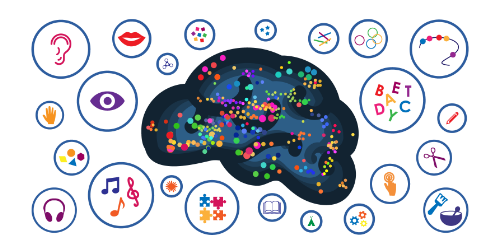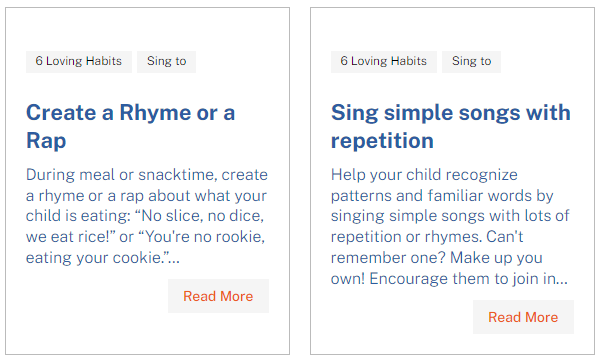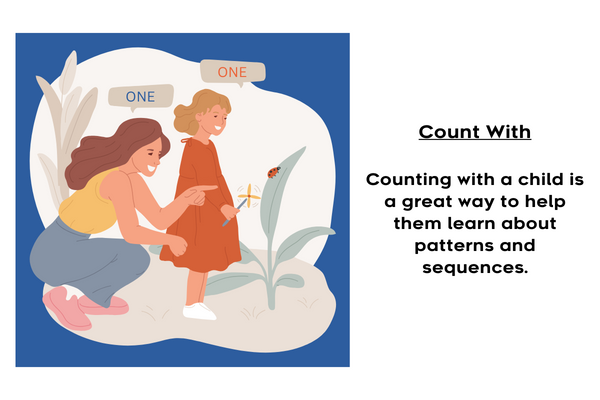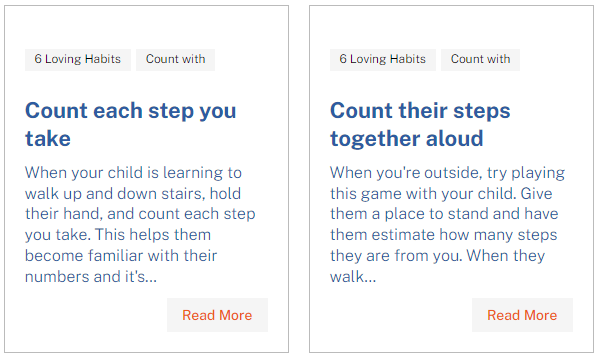The first few years of a child’s life are nothing short of miraculous. It’s a period filled with rapid growth, exploration, and wonder, and it also lays the foundation for their lifelong development. The importance of speaking, singing, reading, playing, counting, and engaging in serve and return during these first few years of life is critical to increased connection and brain development.

Connections between synapses in a baby’s brain are strengthened through repetitive, positive, and nurturing experiences with parents and caregivers. These moments of connection are vital in helping babies build the foundation they need to succeed in life. This is why at GIFT CONNECT, we promote the practice of the 6 Loving Habits, encouraging parents and caregivers to play, sing, read, speak, count, and serve & return – with love.
Speaking and Singing: Building Language Skills


From the moment they are born, infants are like sponges, absorbing the world around them. Speaking and singing to children from birth helps them develop essential language skills. The melodious tones of a lullaby and the soothing rhythm of a parent’s voice are not just comforting but language-building activities. Babies learn to recognize speech patterns, vocabulary, and the nuances of communication. Conversations with infants may not seem like much, but they are the building blocks of future language proficiency.


Reading: Unlocking the World of Imagination

Reading is a magical journey that begins in infancy. It’s a bridge to imagination, knowledge, and a lifelong love of learning. When we read to young children, we expose them to new words, ideas, and concepts. Early exposure to books and storytelling sparks curiosity, fosters creativity, and helps children develop a strong foundation in language and literacy. It’s the key to unlocking the doors to a world of stories and information.

Playing: The Work of Childhood

Play is the work of childhood, as the saying goes. It’s not just a pastime; it’s an essential component of a child’s development. Through play, children explore their surroundings, engage in problem-solving, and develop creativity. It’s during play that they learn to share, cooperate, and navigate social interactions. It’s also where they begin to understand the world around them and develop vital motor skills. Whether it’s building with blocks, exploring a sandbox, or engaging in imaginative play, every moment of play is a moment of growth.

Counting: Laying the Foundation for Math Skills

Mathematics may seem distant to an infant or toddler, but early exposure to counting and numerical concepts is vital. Simple counting games, such as counting fingers or toes, can be an enjoyable way to introduce math. These early experiences lay the foundation for mathematical understanding. Counting, grouping, and recognizing patterns are essential math skills that start to take shape in these early years.

Serve and Return: Building Trust and Attachment

Serve and return interactions are like a dance of communication between caregivers and children. When a child cries, babbles, or reaches out, and the caregiver responds with love and attention, a powerful connection is formed. These interactions build trust and attachment, making children feel secure and valued. This security is the emotional bedrock upon which children develop a sense of self, their capacity for empathy, and their emotional resilience.

Brain Development: Forming Neural Connections
The first few years of a child’s life are a time of rapid brain development. The experiences children have during this period shape the architecture of their brains. Engaging in activities such as speaking, singing, reading, playing, counting, and responding to a child’s needs stimulates the formation of neural connections. These connections are the pathways for learning, memory, and problem-solving.
School Readiness and Lifelong Learning
The early years also set the stage for a child’s educational journey. When children are exposed to language, books, and basic math concepts, they enter school with a significant advantage. They are more likely to have a strong foundation in reading and math, which are essential for academic success. Moreover, the love of learning instilled during these early years can shape a child’s attitude toward education for a lifetime.

